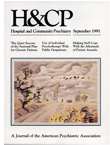Substance Use Disorders in Patients With Chronic Fatigue
Abstract
A high prevalence of mood disorders has been found among persons with chronic fatigue. The comorbidity of mood disorders and substance use disorders has long been recognized. In this study, the preyalence of substance use disorders among 100 patients with chronic fatigue was examined. Twentyeight patients met DSM-III-R criteria for a lifetime diagnosis of substance abuse or dependence; ten of these patients had a current diagnosis. Forty-nine patients had no history of substance abuse or dependence but bad other lifetime psychiatric diagnoses. Twenty-three patients bad no history of substance abuse or psychiatric illness. No differences in demographic characteristics or in the features of chronic fatigue were found among the three groups. Patients with chronic fatigue who had a lifetime history of a substance use disorder reported more lifetime depressive symptoms and were more likely to have had suicidal ideation or attempts.
Access content
To read the fulltext, please use one of the options below to sign in or purchase access.- Personal login
- Institutional Login
- Sign in via OpenAthens
- Register for access
-
Please login/register if you wish to pair your device and check access availability.
Not a subscriber?
PsychiatryOnline subscription options offer access to the DSM-5 library, books, journals, CME, and patient resources. This all-in-one virtual library provides psychiatrists and mental health professionals with key resources for diagnosis, treatment, research, and professional development.
Need more help? PsychiatryOnline Customer Service may be reached by emailing [email protected] or by calling 800-368-5777 (in the U.S.) or 703-907-7322 (outside the U.S.).



